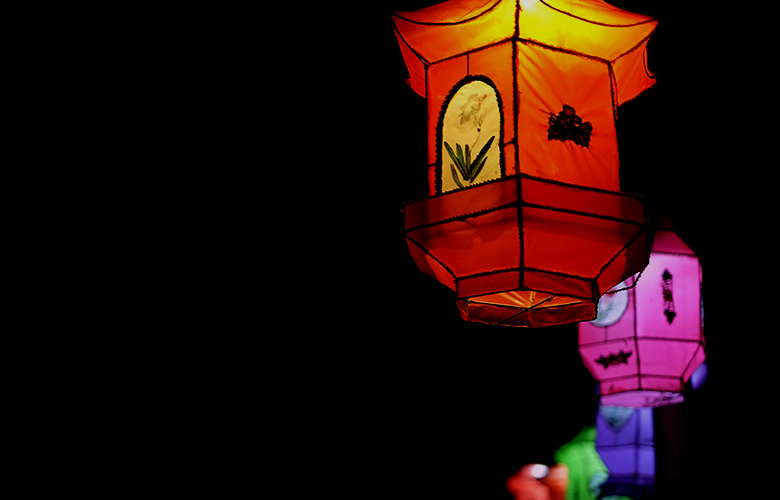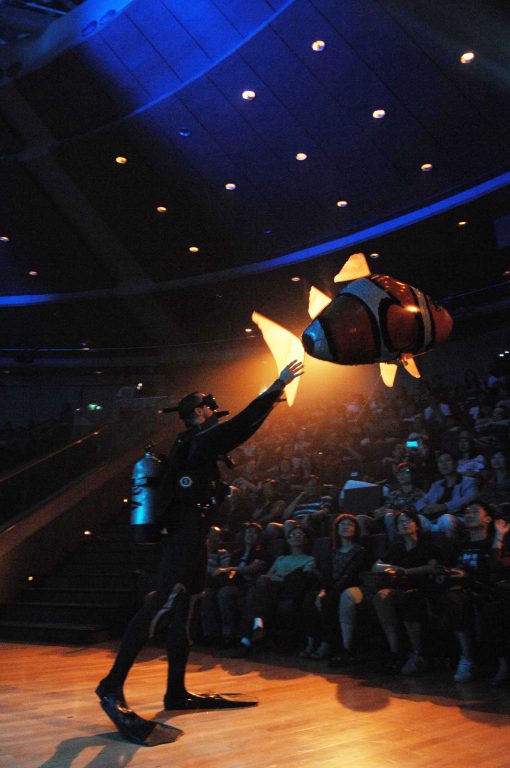
While working for The House of Dancing Water in Macau in 2011, I decided to learn more about theatre organization and management. Thus, I made the rather ambitious decision to add studying for a professional diploma in stage management to my already bursting schedule. For two years, I headed over to Hong Kong on all dark days (days off)… and threw myself into learning as much as I could in a mostly Cantonese-speaking environment at the Hong Kong Academy for Performing Arts (HKAPA).
On an average day, I would try guessing the curriculum and annoy people by inserting English-spoken questions into Cantonese conversations. At age forty-two, I was also the grandfather of the academy. Most classmates were a good twenty years younger than me. When I passed them in the hallways they gazed at me in awe, because I was already working where they all dreamt to find themselves ten years down the line.
During my studies, I did several stage management internships. One of them, in particular, has stayed foremost in my mind: HNHW 5 Senses. As I walked towards my temporary place of work, I remember wondering what the “HNHW” might stand for. Nothing came to mind. The production was the thesis project of Xavier Yu, a Masters student at HKAPA. Opening the door to the venue, I expected a small stage with a couple of actors. What greeted me instead was a set-up worthy of a rock concert. I had never seen so many trusses on a small stage. As I walked in, riggers were assembling truss after truss, with no end in sight. Technicians began to install enormous lighting fixtures, projection, pyro, and the works. Curiously, a fog of obnoxious perfume scents hung in the air as well. Dozens of people were buzzing to and fro while instructing each other in Cantonese.
After much gesticulating and stopping people who didn’t want to be stopped, asking for my team, I finally managed to locate the production manager and four fellow stage managers in a small office at the other end of the venue. I waved and offered a cheery, out-of-breath “Helloooo!”
Everyone turned and looked me up and down as if I had just landed in a large pink spaceship. Looking at them, I noticed that the production manager was most likely the oldest of the bunch, but still at least twenty years younger than me.
“I’m Liam and I’m supposed to work with you guys the next few days,” I said.
“Really?” One of them answered. “Hi Liam, my name is Christy. I am the general stage manager. Aren’t you the guy who works at The House of Dancing Water? I think you’re going to get very bored here. This is nothing compared to what you’re used to.”
“Naw,” I said. “I’ll be fine guys. I’m sorry to say though, I don’t speak a word of Cantonese. Just tell me where you want me and what you want me to do and I’ll try to keep up as best as possible. There’s always something to learn. I’m looking forward to a good week together.”
Christy and the others gave me a funny smile, then a thumbs-up, followed by something that sounded like, “Ok, laaaaa, aaadddoiiiiiil la! Let’s go!”
At least, I understood the “let’s go” part. I trundled after them and concentrated like a first grader trying to spell his first words, to be able to pick up snippets of – what I hoped to be – comprehensible conversation.
And so it went. For a week, I became absorbed in an entirely local Hong Kong Chinese production.
It was a feast of bright, candy colors with the scents of chocolate, gunpowder, pine forests, cherries, and oceans lingering in the air. Set and costume designs looked (to my biased European eyes) gaudy, like I had been stranded in a Seventies Sci-Fi parody. The music consisted of (to my biased European ears) old-fashioned rock tunes mixed with exotic Chinese elements. I couldn’t read the prompt script, and the show’s plot escaped me throughout set-up and rehearsals.
Nevertheless, I measured, rehearsed, and hurried right alongside my young Cantonese teammates. They kept joyfully saying “aaadddoiiiiiil” to each other and to me. And I have to say, they were amazingly expedient and professional. Everything was measured and rehearsed repeatedly until timing and coordination were perfect. Everyone worked at least twelve hours a day. Nobody shouted or lost their composure.
When I told one young student stage manager, “You know, at our theatre, I often hear people shouting at each other,” she said, “They really shouldn’t. It’s undignified. And anyway, when you shout at someone you hurt yourself more than you hurt them.” This stopped me in my tracks. After a moment’s thought, I couldn’t agree more. It seemed students of Western nations (and adults for that matter) could probably learn a lot from these Hong Kong students.
Day by day, I became more fluent within my new surroundings. I surprised myself by learning to decipher what my colleagues were talking about. Every Cantonese sentence had at least one English word that didn’t exist in their language. So if I heard something like, “blablabla duct tape, blaablaaabla blabla bla measuring la, props la, blablabla blabla bla,” I guessed we needed to mark the stage for the scene changes.
Then, during the first full show rehearsal, I finally understood what the production was all about. I must say it was a brilliant, thoughtful composition of multimedia and entertainment elements. Xavier, the creator and producer of the show, had thought hard about how any form of entertainment usually excludes certain parts of society, such as blind or deaf people. He wanted to create an extraordinary experience, which could be shared by everyone – in the truest sense.
Seats had been reserved for blind and deaf people. A sign language translator was positioned to one side of the stage to translate as much as possible for those with hearing impairments. Every act told a separate story, incorporating all five senses. Intensive scents, for those who couldn’t hear or see. Strong colorful projections, lighting compositions, and costumes for those who couldn’t hear or smell. Unusual music, sound effects, and ear-splitting fireworks for those who couldn’t see. The artists entered the auditorium and shook people’s hands, respectfully initiating tactile contact as a further means of connecting with the audience.
 In addition to my duties as stage manager, I got to be part of the show for five minutes during an ocean act. One of the artists, Pam, created a complex web of sounds, eerily reminiscent of floating underneath the waves. Blue light, strobes, and projections of coral reefs and ship wrecks, as well as a refreshing ocean scent (which reminded me more of gym locker rooms than the deep blue) helped further to take us on an underwater journey for just a few minutes. During this scene, I greatly enjoyed waddling across stage in full SCUBA gear, operating a remote-controlled, giant Nemo floating above my head. As I made my way towards the audience, I manoeuvred big Nemo over people’s heads, eliciting cries of excitement from children and adults alike.
In addition to my duties as stage manager, I got to be part of the show for five minutes during an ocean act. One of the artists, Pam, created a complex web of sounds, eerily reminiscent of floating underneath the waves. Blue light, strobes, and projections of coral reefs and ship wrecks, as well as a refreshing ocean scent (which reminded me more of gym locker rooms than the deep blue) helped further to take us on an underwater journey for just a few minutes. During this scene, I greatly enjoyed waddling across stage in full SCUBA gear, operating a remote-controlled, giant Nemo floating above my head. As I made my way towards the audience, I manoeuvred big Nemo over people’s heads, eliciting cries of excitement from children and adults alike.
I have rarely seen a more engaged audience. People radiated joy and happiness like a galaxy sparkling with the brightest stars. I felt unity, genuine happiness, and gratitude all around me. At the end of the show, people jumped to their feet. Their applause resounded through the house like a thunderous heartbeat.
As self-explanatory as the “5 Senses” part of HNHW 5 Senses turned out to be, I am still mystified as to the meaning of ‘HNHW”. Another riddle did not remain lost in translation, however. What had sounded like a Chinese phrase, “aaadddoiiiiiil”, turned out to be a popular English metaphor Hong Kong students had come up with to spur each other on to give their utmost best. It simply meant, “add oil”.
And add oil we did, throughout the production. Needless to say, during the short run we had, every show was a full success. As for me, I learned a lot and am forever grateful to my Cantonese colleagues. There is nothing more valuable than opening your mind, letting go of everything you think you know, and thoroughly exposing yourself to living and working in a foreign culture.
More from Liam Klenk:
https://www.theatreartlife.com/staying-still/everything-is-possible/
https://www.theatreartlife.com/staying-still/a-spot-of-belonging/
Join TheatreArtLife to access unlimited articles, our global career center, discussion forums, and professional development resource guide. Your investment will help us continue to ignite connections across the globe in live entertainment and build this community for industry professionals. Learn more about our subscription plans.
Love to write or have something to say? Become a contributor with TheatreArtLife. Join our community of industry leaders working in artistic, creative, and technical roles across the globe. Visit our CONTRIBUTE page to learn more or submit an article.


Liam Klenk was born in Central Europe and has since lived on four continents. Liam has always been engaged in creative pursuits, ranging from photography and graphic design, to writing short stories and poetry, to working in theatre and shows. In 2016, Liam published his first book and memoir, 'Paralian'.
Read Full Profile© 2021 TheatreArtLife. All rights reserved.

Thank you so much for reading, but you have now reached your free article limit for this month.
Our contributors are currently writing more articles for you to enjoy.
To keep reading, all you have to do is become a subscriber and then you can read unlimited articles anytime.
Your investment will help us continue to ignite connections across the globe in live entertainment and build this community for industry professionals.